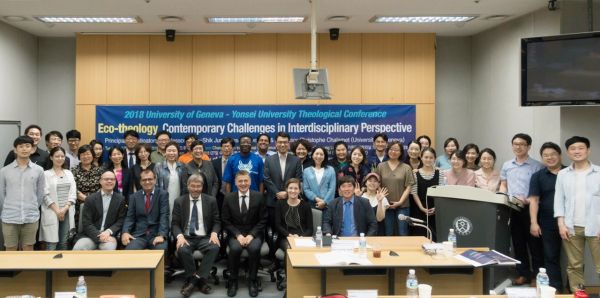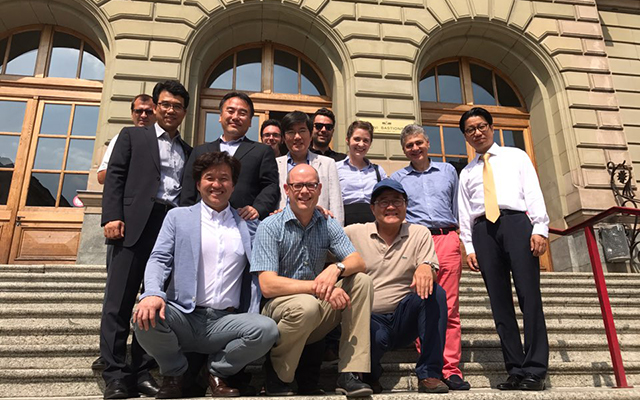- Yonsei and UNIGE Advance Eco-theology October 23, 2018
-
Yonsei University and the University of Geneva discuss eco-theology as strategic partners
 Underwood Theology Hall at Yonsei University
Underwood Theology Hall at Yonsei UniversityEco-theology is a form of constructive theology that focuses on identifying prominent issues within the relationship between religion and nature, particularly in the light of environmental concerns. It explores the interaction between ecological values, such as sustainability, and the human domination of nature, thus initiating numerous religious-environmental projects around the world.
To address eco-theology in today’s environmental crisis, Yonsei University College of Theology and University of Geneva (UNIGE) Faculty of Theology jointly held the 2018 UNIGE-Yonsei Theological Conference on June 26–27 with the theme, “Eco-theology: Contemporary Challenges in Interdisciplinary Perspective.” Held in partnership with SKK Center for Climate Change and International Law and the Embassy of Switzerland in Seoul, this year’s conference took place at Underwood Theology Hall and Yonsei-Samsung Library of Yonsei University’s main campus in Seoul, Korea.
 2018 UNIGE-Yonsei Theological Conference group photo (Seoul, Korea)
2018 UNIGE-Yonsei Theological Conference group photo (Seoul, Korea)This year’s conference covered a wide array of topics on the current issues of eco-theology with an interdisciplinary approach. In Session 1, Yonsei professor Hyun-Sook Kim presented on multicultural religious education from a Trinitarian perspective and UNIGE professor Hans-Christoph Askani discussed the human response to the global environmental crisis. Yonsei professor Deok-Young Park of the Law School contributed to the discussion with his presentation on the Paris Agreement and its future challenges for Korea.
In the second session, UNIGE professor Christophe Chalamet shared his views on what kind of natural theology is needed today, and professor Soo Youn Kim of Ewha Womans University presented on an ecofeminist theological pre-reading of Christological incarnation in the posthuman condition. UNIGE professor François Dermange concluded the session by discussing if Calvin is really responsible for the exploitation of nature.
The last session began with UNIGE professor Jean-Daniel Macchi giving a presentation on environment, technology and wisdom according to the book of Job. Yonsei professor Moon Son then presented an eco-theological perspective on the ESD model of Christian higher education on climate change, which UNIGE professor Sarah Stewart-Kroeker discussing the environmental ethics of sacrifice.
During the program, Yonsei University College of Theology and UNIGE Faculty of Theology held a collaboration agreement signing ceremony to further promote exchange between students, faculty and researchers. The two universities have also agreed to jointly publish a research paper on the results of the joint conference in Germany.
Since its launch in 2016, the UNIGE-Yonsei Theological Conference has aimed to foster significant dialogue on key contemporary issues and themes and is held as part of the university-wide strategic partnership between the University of Geneva and Yonsei University.
 2017 UNIGE-Yonsei Theological Conference group photo (Geneva, Switzerland)
2017 UNIGE-Yonsei Theological Conference group photo (Geneva, Switzerland)The two universities have been collaborative partners since 2007 and — in the framework of their internationalization strategy — established a strategic partnership in 2013 to further strengthen links in all academic areas, including teaching, research and other joint initiatives. Main collaborative activities of the strategic partnership include the UNIGE-Yonsei Seed Fund, which facilitates seed funding of collaborative research projects, and the opening of joint centers on both campuses.
<Originally published on August 8, 2018>
show mobile menu
mobile menu




